 Petzlover
Petzlover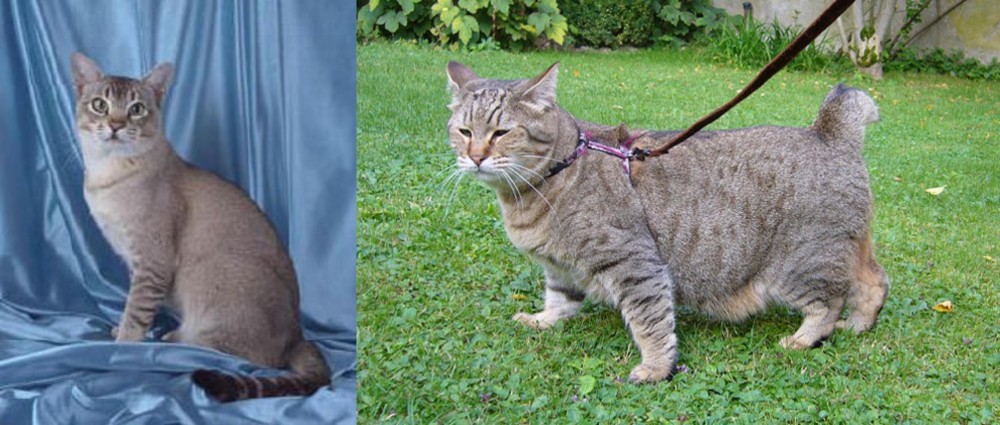 Both American Keuda and Pixie-bob are originated from United States. Both American Keuda and Pixie-bob are having almost same weight. Both American Keuda and Pixie-bob has same life span. Both American Keuda and Pixie-bob has same litter size. Both American Keuda and Pixie-bob requires Low Maintenance.
Both American Keuda and Pixie-bob are originated from United States. Both American Keuda and Pixie-bob are having almost same weight. Both American Keuda and Pixie-bob has same life span. Both American Keuda and Pixie-bob has same litter size. Both American Keuda and Pixie-bob requires Low Maintenance.
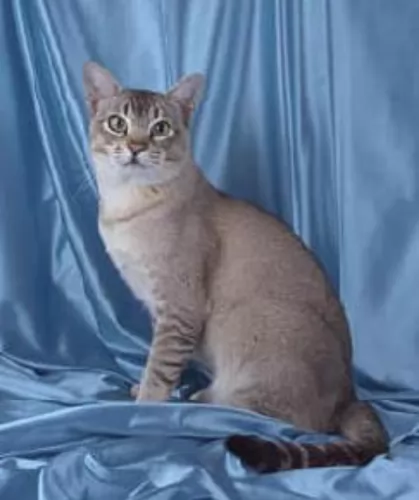 It is thought that the cat was brought to America by the Spanish to keep the rat population down.
It is thought that the cat was brought to America by the Spanish to keep the rat population down.
The name KEUDA stands for Kitten Evaluation Under Direct Assessment which is actually the name of a program that was running in Texas, Oklahoma and New Mexico and was for investigating the kinds of cats that survived as barn cats.
Today the Keuda isn’t registered and it’s not a well-known cat either, being looked upon as being similar to the Egyptian Mau breed as it shares some physical similarities with the Mau.
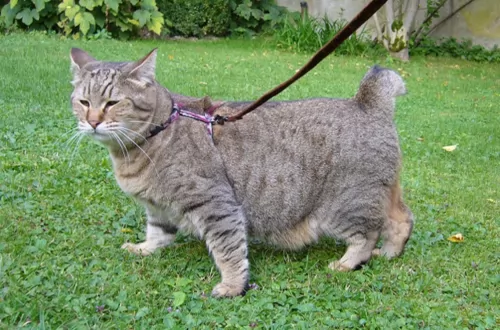 The Pixie-Bob breed is thought to have started from the unplanned litter of a bobcat and a barn cat in 1985. The whole idea of the Pixie-Bob was to get a cat that resembled the North American Bobcat.
The Pixie-Bob breed is thought to have started from the unplanned litter of a bobcat and a barn cat in 1985. The whole idea of the Pixie-Bob was to get a cat that resembled the North American Bobcat.
The barn cat belonged to Carol Ann Brewer, and she named a female kitten Pixie. Pixie became the foundation mother for this breed.
In fact, it was in 1989 that she wrote the first breed standard, naming the breed Pixiebob, in honor of Pixie. In 1998, the Pixiebob achieved TICA championship status. Today, the International Cat Association (TICA) recognizes the Pixie-Bob as a breed.
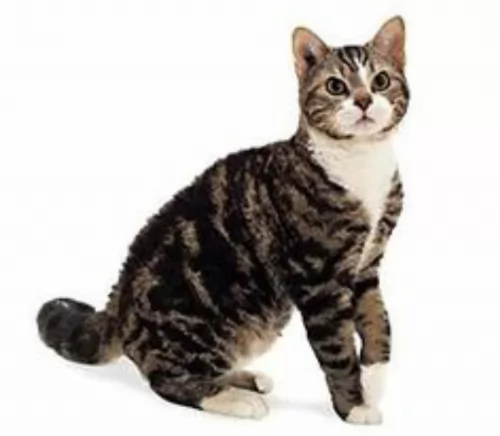 You can’t really pin-point what the American Keuda looks like as it looks a lot like the Maus but it can also look like a Siamese cat or even others.
You can’t really pin-point what the American Keuda looks like as it looks a lot like the Maus but it can also look like a Siamese cat or even others.
It is a medium-sized cat and can weigh up to 5 or 6kg while being very lithe and athletic. The head of the cat is medium-sized, the ears medium-large, the eyes almond-shaped, and the tail is slightly tapered.
An unusual aspect with this cat is its belly flap – loose skin that flaps at each elbow. The head is wedge-shaped, it has almond-shaped eyes, large ears and the fur is soft and silky and in a variety of patterns as well as solid colors. The coat is short to medium in length and there is no undercoat.
American Keudas are just your regular cat in personality - active, adaptable, inquisitive, and intelligent while being strong and agile.
They are also adaptable and social, getting along well with children as well as other pets in the home. It is also quite unusual in that it likes playing with water. They are also playful and love running, jumping and climbing and indoors it will want a climbing cat tree.
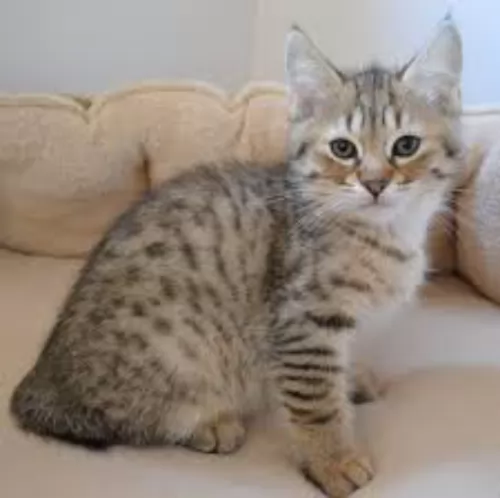 The Pixie-Bob is a medium to large cat that can weigh up to about 8kg. They stand between 25 and 33cm in height.
The Pixie-Bob is a medium to large cat that can weigh up to about 8kg. They stand between 25 and 33cm in height.
It's a muscular cat. These cats have a thick double coat which can be short-haired or long-haired. Most times they have a striped coat pattern with some rosettes. In fact, the pattern on the fur is much like that of a Bobcat.
Their eyes are triangular shaped and they have quite a distinctive heavy brow. The eyes are usually a honey color or they can be green. The tail is rumpy or non-existent or it can be a few inches in length. Sometimes the ears will have some feathering at the tips.
They are polydactyl which means that with their paws, they have more than the regular number of digits.
In spite of there being a wild side to this coat, they are amicable, fairly laid-back type of cats. Pixie-Bobs enjoy being with their owners, loving to quietly spend time with their human beings.
They’re not cats that form a strong bond with just one family member, but they are friendly with everyone in the family. When a stranger calls, they may run off however, to hide in a safe spot.
Some people describe them as dog-like. These cats also have a love for water so don’t be surprised if you see him spending a lot of time playing around his water bowl. This is a cat that just loves being the center of everything that is going on, and yet he has a calm aura about him.
The Pixiebob is talkative, chirping and chattering away as he tells you about what he has got up to during the day.
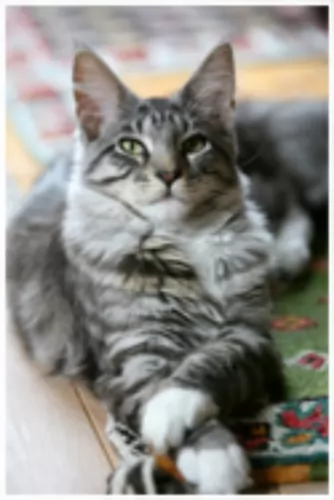 The beauty of American Keuda cats is that they are no-fuss cats and they are energetic, amicable, social, and playful and they make wonderful companions.
The beauty of American Keuda cats is that they are no-fuss cats and they are energetic, amicable, social, and playful and they make wonderful companions.
They are also fond of water and can even strike up a friendship with your dog. By bringing a Keuda into your home you can rely on a steady, loving friendship with your feline friend.
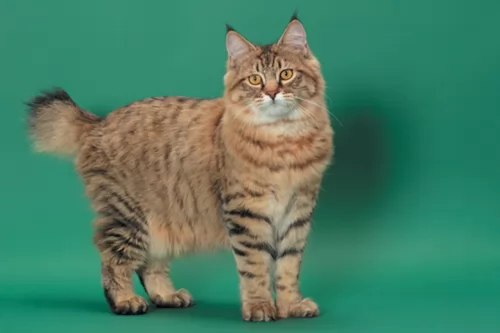 The Pixie-Bob just loves being around his human family and he forms strong bonds with them.
The Pixie-Bob just loves being around his human family and he forms strong bonds with them.
They are social cats and like a dog, they try to become involved in the going-on of the family. By treating this cat well and providing him with a loving home, he is capable of making you a most amicable and energetic member of the family.
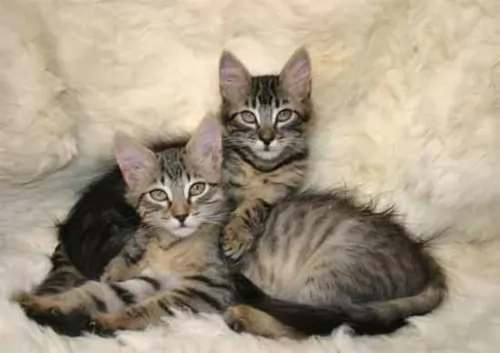 Thes cats enjoy good health and live to be 15 years of age or older even. You just have to watch out for him as they have no undercoats and it’s not a cat to do well in the cold.
Thes cats enjoy good health and live to be 15 years of age or older even. You just have to watch out for him as they have no undercoats and it’s not a cat to do well in the cold.
Whenever you buy a cat for the first time, try and find out about vaccines and previous conditions that might require special treatment.
Healthy kittens and cats are always alert and energetic with shiny coats and clear eyes.
Dental disease is quite common in cats, and it is always a good idea to have your pet’s teeth checked by your vet. Signs of pain with dental problems can include lethargy, pawing at the mouth, facial swelling, and reduced appetite. Get your cat immediately to the vet if you suspect problems with his teeth.
Neutering and spaying are imperative if you don’t want your pet to have kittens. It’s a simple operation for your pet and it comes with many health benefits for your cat. You don’t want your female cat having kittens as there are just already so many stray cats in shelters. Spaying and neutering mellows a cat too, makes them less prone to wandering, spraying, and fighting.
Make sure you have your American Keuda vaccinated against the many cat diseases that there are. Vaccinations are available against feline infectious enteritis or feline parvovirus, cat flu and feline leukemia virus, a disease that damages the cat’s immune system. Kittens require their first vaccine at around 8 weeks of age.
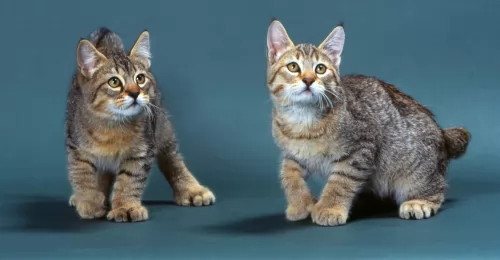 These are healthy cats and they don’t easily get sick. There are always some cat health issues that can crop up with any cat, and with the Pixie Bob, they seem to battle with delivering litters.
These are healthy cats and they don’t easily get sick. There are always some cat health issues that can crop up with any cat, and with the Pixie Bob, they seem to battle with delivering litters.
Sometimes you will hear of Cryptorchidism in these cats which means there is the absence of the testes or scrotum.
Whatever health issues your cat has, always make sure that you get him to the vet for his immunizations as well as for check-ups.
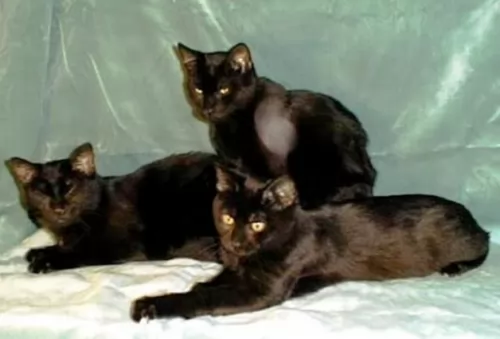 Every cat needs to be fed a complete, balanced high-in-protein food. There are heaps of different brands of cat food on the market - wet and dry. Always follow the manufacturer’s instructions and recommended amounts. If in any doubt about what to feed your cat, speak to your vet. Every cat needs a constant supply of fresh, cool water.
Every cat needs to be fed a complete, balanced high-in-protein food. There are heaps of different brands of cat food on the market - wet and dry. Always follow the manufacturer’s instructions and recommended amounts. If in any doubt about what to feed your cat, speak to your vet. Every cat needs a constant supply of fresh, cool water.
Both young and older cats love to play so ensure you provide your cat with stimulating toys as well as things such as climbing trees and a scratching post. Cats enjoy a high-up place where they can feel safe and view their surroundings from a height.
Cats spend many hours a day sleeping and you need to provide your cat with a warm, dry, comfortable, quiet place to rest. There are many cat beds available, but if you don’t have one, a cardboard box with one side removed and a soft cushion or blanket will do.
Invest in a litter box for your cat to do his business in and keep it in a safe, quiet place where your cat can ‘toilet’ in peace and quiet. These should be placed away from the food and water bowls. Make sure to keep a small plastic rake close by and rake up the cat droppings regularly to ensure the litter tray is nice and clean.
Your American Keuda is a short-haired cat but you want to brush the fur gently at least once a week. Grooming also provides you and your cat with some valuable bonding time.
Provide your cat with a collar to show everyone that he is yours. Also, have your cat microchipped – a tiny chip that carries your pet’s unique ID number and which is inserted safely and gently under the cat's skin.
Have your cat treated and free from parasites such as ticks, fleas, and worms. Speak to your vet about this.
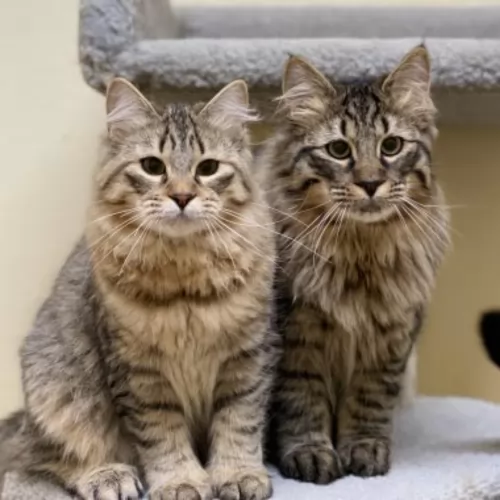 Pixie-bobs don’t require any special diet. When it comes to commercially manufactured cat foods, there are wet foods, dry foods and combination foods. You’ll find out what your cat likes, but remember that a cat is a carnivore and that meat is what they eat.
Pixie-bobs don’t require any special diet. When it comes to commercially manufactured cat foods, there are wet foods, dry foods and combination foods. You’ll find out what your cat likes, but remember that a cat is a carnivore and that meat is what they eat.
Always go for high-quality foods if you are able to because the best foods are better able to keep your cat healthy. The nutritional needs of a cat change as he grows and matures and there are cat foods specially manufactured for every season of your Pixie-Bob’s life.
Always ensure that there is a bowl of clean, fresh, cool water available to your cat.
The short hair of the Pixie-Bob means that it will be easy to give your cat a brush once a week to remove loose hairs.
Always get your cat to the vet when he shows signs of illness. If he comes to you as a kitten he will need his vaccinations as well as worm medicine. Your vet will inform you when to bring you cat in for the next round of vaccinations.